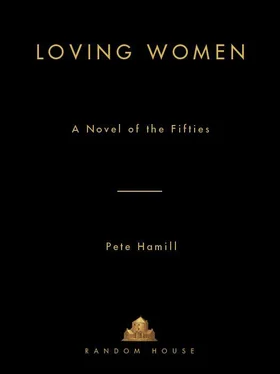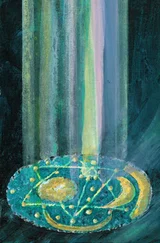The Café of the World.
I crossed the street and sat down at an empty table. It was cooler there, with a breeze lifting off the black river. There were only two items on the menu: coffee and beignets. I didn’t know what beignets were but when the waiter came over I ordered them anyway.
“Chicory in da coffee?”
I didn’t know what chicory was either, but I said sure , why not ? He came back with a plate of doughnuts without holes, covered with confectioners’ sugar. Beignets. I sipped the coffee, which was more powdery than ordinary coffee, the taste somehow grainy, and it was delicious. I gulped down the beignets, waved for more, and ate them in a kind of frenzy. Then I sat back, belching, swollen, as if exhausted by the sudden gorging. A riverboat went by with its lights all dazzling and bright and a band playing and people on deck and I wished that Eden was with me, drinking that special coffee, watching that river, sitting in the Café of the World.
I woke late and everything was wet: my body, the sheets, the walls. I reached for the towel beside the sink. It was damp. I got out of there in a hurry.
This time I followed the black people’s faces through the city until I came to a district where the architecture was different, the houses low and tin-roofed. If the doors were open, I could see all the way through them into the backyards. Black people sat on the front porches fanning themselves, drinking cold tea or lemonade, laughing in growly voices. I started showing them the drawing of Eden, but most were suspicious. Who was this white man and what he want ? And then retreated into icy lemonade and muffled laughter.
Toward late morning I felt heavier, damper, hotter, oddly drowsy, thinking: Maybe she just told me a mess of lies. Maybe she wasn’t from New Orleans at all. Maybe she was from Memphis or Texas or some other goddamned place in America. Maybe she wasn’t even from the South. And if that was true (I thought, moving into laundries and barber shops and bars), then I’d ruined my life for a lie. And for sure, I would never find her .
And then a woman with sad yellow eyes and heavy breasts and a long pink housecoat looked at the picture and said, “Why, dat’s Eden.”
I felt weak.
“Do you know where she lives?” I said.
“Oh, she moved away long tahm ago.”
“How long?”
“Two, t’ree years?”
“Do you know where she went? I said.
“Feared ah don’t. Her man Mist’ Rob’son in trouble again?”
“James Robinson?”
“Yeah … Big ole handsome fella. But bad news .”
“It’s Eden I’m looking for. Not him.”
“You trah da choich?”
“What church?”
“Da Catlick choich. Up by da square. Da St. Louis Cathedral. Where else a Catlick goil might be found?”
I told the woman that if she saw Eden Santana, to tell her I was in New Orleans. I tore a corner off the drawing and wrote down the address of the hotel on Chartres Street. I handed it to her and thanked her. And then started for the Cathedral.
The sky grew dark and tumultuous. Trees filled and bent in the wind. People started hurrying along the streets. A few shopkeepers began to lower their shutters. A storm was coming, but I didn’t care. This trip, this journey, was not the result of a series of lies. Eden Santana really was from here. She really had been married to a man named James Robinson. And I was sure she was still there in New Orleans. Somewhere. Maybe round this next corner.
Jackson Square was deserted when I reached the cathedral. The main door was closed, but I found an open side door and went inside. I could smell the familiar traces of incense and burning wax; the odor made me feel like a Catholic. There was no Mass being celebrated, but there were a lot of women in black scattered around the pews, and a few black men, all of them praying in solitude. Off to the right, men and women waited on line outside a confessional booth.
I walked slowly down a side aisle to the altar, glancing at faces, hoping to see Eden. She wasn’t there. I bought a candle for a nickel and lit it and knelt at the altar rail, wishing I still believed enough to pray. I didn’t but my face felt as hot as the flame of the candle. I tried to understand the layout of the cathedral, so that I could get back into the sacristy and find a priest. There was a door over to the right, as there was back home at Holy Name. I crossed the front of the cathedral, genuflecting in the center out of old habit, and went into the sacristy.
There were rotting flowers on a table, an open closet holding cassocks and surplices for altar boys, boxes of candles from Benziger Brothers, New York. I walked over to the dark passageway that led behind the altar and saw a figure coming toward me. I felt weak. Small. As if I was an altar boy again, serving in contempt and fear. I needed something cold to drink.
The figure came closer, his face obscure in the unlighted passage. And then emerged into the dim light of the sacristy.
An old priest, dressed in black.
“Can I help you?” he said in a soft voice.
“Yes, yes, Father. I’m looking for someone … A friend. She’s Catholic. And I thought maybe you might have some address for her, a telephone number.”
“Well—”
I took out the drawing, which was smudged now, and told him Eden’s name and a little about her husband. The priest’s voice was whispery and dry, like dead leaves.
“Both names are common in New Orleans,” he said, “although Santana is a lot more … Catholic than Robinson.” He scratched his scalp, then gazed at his nails. They were dirty. “I would have to look though church records. Is there any, er, trouble in this?”
“No. No trouble. I’m a friend . She knows me.”
“Because I couldn’t, well—”
“If you could find her, don’t even tell me where she lives, if that’s what you’re worried about. Just tell her that I’m here and where I am. She can come to me.”
He took a pack of Camels from under his habit and lighted one. It was the first time I’d seen a priest smoke.
“You know, last year, someone came looking for one of my a parishioners.… And I was taken in. I gave my visitor the address and my poor parishioner is now serving twenty years at Angola. That’s the prison farm.… You’re not from New Orleans, are you?”
“No.”
He waited for me to tell him where I was from. But I said nothing. Something in me made it hard to lie to a priest, even if I didn’t believe what he believed anymore.
“You don’t have to tell me where you’re from,” he said. He took a deep drag and then made a smoke ring and gazed proudly at its perfection. “But maybe you should tell me what kind of trouble you’re in.”
“I can’t.”
“Nobody will know.”
“I don’t believe in confession anymore, Father.”
“But you did once.”
“Yes.”
“I might be able to help.”
“Thank you, Father. But I don’t think you can …”
“Is the woman part of the trouble?”
“No.”
“That bad, huh?”
“I’m in love with her.… That’s all.”
“That’s everything.”
“Father?”
“Yes.”
“Can I have a glass of water?”
The summer storm hammered at the city, all water and wind, with garbage cans going over and awnings flapping and broken umbrellas careening away. Dozens of people huddled in the entrance of the Cathedral, making nervous jokes about hurricanes and disasters. There was a tremendous ka-pow and the square was instantly bright with lightning and everybody backed up, laughing and afraid. We were all huddled together, blacks and whites joined in a common need for safety.
Читать дальше












